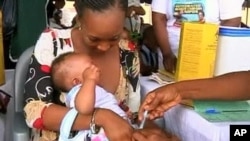A public-private health consortium is asking international donors for $3.75 billion to help provide vaccines that could save the lives of four million children around the world by 2015. The Global Alliance on Vaccines and Immunization will meet with donor groups at a pledging conference in London Monday (6/13).
International health organizations say vaccines save two million lives every year, and could save twice that many if made more accessible to children in the developing world.
Over the next 10 years, the Bill and Melinda Gates Foundation and the Global Alliance on Vaccines and Immunization (GAVI) hope to immunize more of the world's children against basic infectious diseases and bring down the childhood death rate.
To accelerate progress in vaccine development and delivery, the Gates foundation has called for a new "Decade of Vaccines."
"…if we accelerate our efforts in the areas of vaccine discovery, development, and delivery we can make these vaccines available to more people sooner and that means lives saved, healthier people and benefits beyond health," noted Nicole Bates with the Bill and Melinda Gates Foundation.
Major drug companies announced last week that they will provide life saving vaccines at reduced prices in the world's least-developed countries. Doctors say providing life-saving pentavalent vaccine for such killer diseases as diphtheria, tetanus, pertussis, hepatitis B, and Haemophilus influenza type B will save more than 6 million lives by 2020. The GAVI Alliance helps pay for this vaccine in 72 low-income countries.
David Ferreira of GAVI says in some cases costs can be cut 67 percent per dose.
"It's incredibly important that the prices of vaccines be structured and be pitched in such a way and at such a level that they are actually affordable and sustainable and that you can have a truly global vaccine market and not just a market that caters only to the rich world," noted Ferreira.
Experts say it costs anywhere between $500 million to $1 billion to bring a new vaccine onto the market, and the costs go up as the disease develops new strains.
A new study shows that vaccines not only save millions of lives, but also billions of dollars in treatment costs and lost economic productivity. It says the economic benefits are worth billions more.
Previously, the World Health Organization estimated it cost about $300 million to eradicate smallpox, but said the annual savings from no longer fighting the disease came to about $1 billion.
Critics charge that GAVI's funding arrangement is not sustainable, but David Ferrerra disagrees.
"Developing countries develop and so it is important that over time they take ownership of immunization and other developmental programs that they are engaged in and fully fund those as their ability to do that grows," said Ferrerra.
Governments and the private sector increasingly join forces to get vaccines out on the market and vaccines against meningitis A and pneumonia are now available in poor countries for less than 50 cents a dose. GAVI says more vaccines can only be made available when additional funding is made available.











